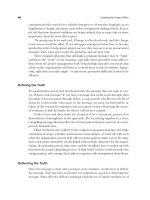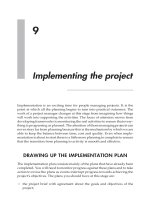Evaluating the project
Bạn đang xem bản rút gọn của tài liệu. Xem và tải ngay bản đầy đủ của tài liệu tại đây (93.14 KB, 10 trang )
15
Evaluating the project
Evaluation involves making a judgement about value. An evaluation usually
takes place at the end of the project, but one can be held during a project if a
need is perceived for something more substantial than a review. Sometimes
evaluations are held quite a long time after the completion of a project to see
whether the long-term aims were achieved effectively.
If it is to be effective, evaluation needs to be focused in some way so that
it is clear what is to be judged and what needs to be considered.
PAUSE FOR THOUGHT
Make a note of what you might evaluate at the end of a project.
You might want to carry out an overall performance evaluation to
consider the economy and efficiency of the performance through
which the outcomes were achieved or not against the planning pro-
cess. There might also be evaluation of inputs into the project, to
review whether the resources were adequate in quality and quantity
for the job.
You would usually evaluate the outcomes to identify the extent to
which all of the intended outcomes were achieved. The outcomes
might be wider in scope than the objectives if the purpose of the
project was to carry out a change through achievement of a group of
objectives. This might review the overall effectiveness of the outcomes
and might also seek to identify any unintended outcomes. Of course,
an evaluation might be planned to consider several of these factors at
once.
It is very important to determine the purpose of an evaluation before setting
up a process. Evaluations are often held to report on the value of outcomes
achieved in relation to the value of investment of resources to achieve that
outcome. Where value is concerned, opinions often vary, and one of the key
questions to ask at an early stage is who should carry out the evaluation and
whose opinions should be taken into account. Evaluations have to be
reported in some way, and often make recommendations for future projects
as well as reporting on the one being evaluated. In this sense, there is often a
lot of learning that can be captured by carrying out an evaluation so that
future projects can benefit from that previous experience.
EVALUATION DURING A PROJECT
In the early stages of a large project it might be appropriate to carry out an
evaluation to ensure that the inputs planned are of sufficiently high quality
and quantity to enable the objectives to be achieved. This can be particularly
important if competition to be awarded valuable contracts will be significant.
If potential contractors are very anxious to win a contract they might try to
do so by offering the lowest price or the quickest completion date. This might
be attractive to those responsible for making the choice, but if the contractor
proves to be unable to deliver what was promised, the project will suffer.
Those evaluating tenders need to be able to anticipate the budget and timing
necessary for a particular piece of work in order to make an effective evalu-
ation of tender bids – the cheapest is not necessarily the best, nor is the one
that seems to promise an impossibly fast completion.
There may also be an evaluation to determine whether the project is going
in the right direction, particularly if change in environmental conditions
indicates the need for a change in the strategic direction of the organization.
It might be necessary in that case to realign the project so that the outcomes
contribute to the new direction. In some cases, it may be necessary to abort
the project if it is no longer appropriate.
174
Managing projects in human resources
Incorporating an early evaluation as part of the project plan (formative
evaluation) can considerably enhance the outcomes. However, one of the most
important characteristics of a project is its boundaried nature. If change is
anticipated during the life of the project there will be implications for all
aspects of the management of the project. If formative evaluation is to be
included, it should be an integral part of the design of the project. It can facil-
itate a more organic change process, with testing and refining built in as the
project progresses. However, it can also increase the complexity of a project
because of the need to synchronize an extra set of deadlines that relate to
carrying out the evaluation. It will also add new items to the risk log, partic-
ularly the risk of delays. A formative evaluation that results in decisions to
make more significant changes to the project may increase the timescale or
the budget, or present requirements to meet additional quality measures.
EVALUATION AT THE END OF A PROJECT
There are many different types of evaluation that may take place at the end
of a project. The most usual evaluation is to determine the extent to which
the project outcomes have been achieved. This is often carried out in a meet-
ing of the sponsor, key stakeholders and the project team leaders, sometimes
informed by reports from key perspectives. An evaluation of this nature may
be the final stage in completion of the project, and the main purpose is usually
to ensure that the project has met all of the contracted expectations and can
be ‘signed off’ as complete. A different type of evaluation may be held to
review the process, with the purpose of learning from experience. This is
often done by comparing the project plan with what actually happened to
identify all the variations that occurred, in terms of both processes and out-
comes. The purpose in this approach is to draw out the key lessons of how
to avoid such variations in future projects and how to plan more effectively
for contingencies.
An evaluation based on the information gained through monitoring may
be held at the end of the project as a final summative evaluation. This is a
process through which to identify:
࿖
whether the project objectives have all been achieved;
࿖
which aspects of the project went well;
࿖
which aspects went less well;
࿖
what you would do differently next time.
Evaluating the project
175
The aim of this type of evaluation is to understand the reasons for success or
failure and thus to learn from the experience in order to improve on perfor-
mance in future. At the end of a project it is possible to evaluate the extent to
which each stage of the project went to plan and to explore the implications
of any deviations from the original plan. The implications might reveal that
planning could have been more detailed or accurate, that there were obstacles
that had not been predicted, that estimates had been inaccurate or that other
aspects of the relationship between plans and actions could have been man-
aged more effectively. Evaluation of the separate stages of a project is also
likely to produce information that can be used to improve the management
of projects in future.
Another type of evaluation that can be usefully carried out after a project
is a wider consideration of the extent to which the project succeeded in
achieving its purpose as a contribution to the progress of the service or orga-
nization. This type of evaluation might be wide enough to include all recent
projects held within an area of work, to investigate whether the contributions
made by each were good value. It might also consider whether the value
could have been increased by managing them in a different way, perhaps by
linking them as part of a larger project or by splitting them into smaller
projects. Although it will be too late to change what has happened, much can
be learnt that can inform how future projects are defined and managed. For
example, it might be found that more assistance is needed to enable project
managers to estimate costs and times and that other resources from the orga-
nization (perhaps finance, personnel or health and safety) could have helped.
If there are frequently projects that involve staff in taking the lead in man-
aging projects it might be appropriate to develop specific training to improve
how projects are managed. The lessons learnt from evaluations can be used
to inform higher-level strategic planning as well as to improve management
of projects.
DESIGNING A FORMAL EVALUATION
Reviews and informal evaluations will often be sufficient, but there will be
times when a formal evaluation is necessary. A formal evaluation can be both
time-consuming and expensive because of the numbers of people involved,
and therefore must be carefully designed and planned.
There are a number of decisions that have to be made in designing an eval-
uation. The following questions will help you to begin to plan:
176
Managing projects in human resources
࿖
What is the evaluation for?
࿖
Who wants the evaluation?
࿖
What is to be evaluated?
࿖
What information will be needed?
࿖
How and from what sources will the information be gathered?
࿖
How will criteria for evaluation be set and by whom?
࿖
Who will do the evaluation?
࿖
Who will manage the process?
࿖
How will the findings be presented?
࿖
What use will be made of the findings?
All of these questions relate to the overall purpose in deciding to hold an
evaluation, and if each is considered as part of the design process, the answers
will enable the process to be planned.
PLANNING AN EVALUATION
The purpose of the evaluation should be considered in order to identify clear
aims and objectives for the process. It is helpful to decide where the bound-
aries of the evaluation should lie. How much or how little is to be evaluated?
It can be costly and time-consuming to hold an evaluation. There is a cost
involved in collecting information and preparing documentation as well as
in holding the necessary meetings. You might save some expense by consid-
ering the extent to which already existing information might be used.
The purpose of an evaluation determines, to some extent, the audience
for delivery of the results. An outcome evaluation might be for the sponsor
of a project but a performance evaluation might be undertaken for a service
provider partway through a project. The nature of the audience may also
determine the way in which the results of the evaluation are reported and
used.
One of the key decisions in the planning stage is who should carry out the
evaluation. If, for example, the evaluation was of the outcome of a major
project paid for by public funding, an external and independent evaluator
would usually carry it out so that the results would be credible to the general
public. A formal evaluation of a collaborative project might be held by a
group of the key stakeholders, each able to report back to their own group or
Evaluating the project
177









